#Leir
Text
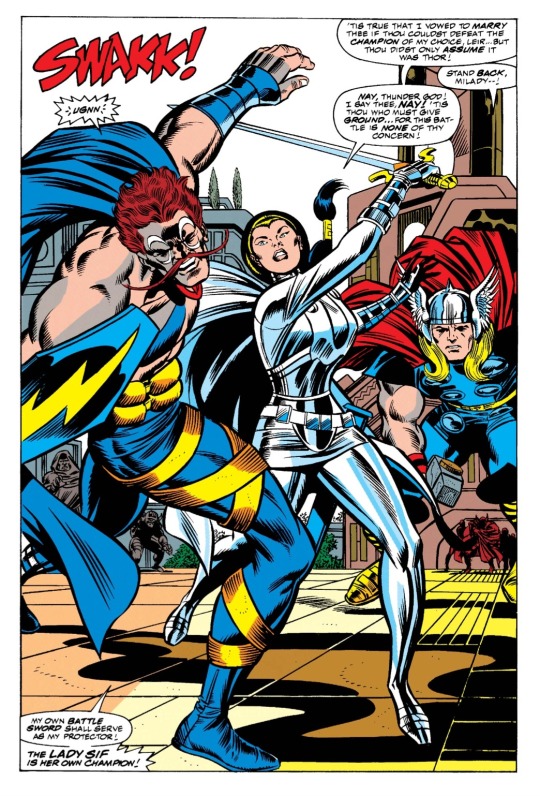
Mighty Thor #426
Tom DeFalco & Ron Frenz
6 notes
·
View notes
Text

Leir
9 notes
·
View notes
Photo
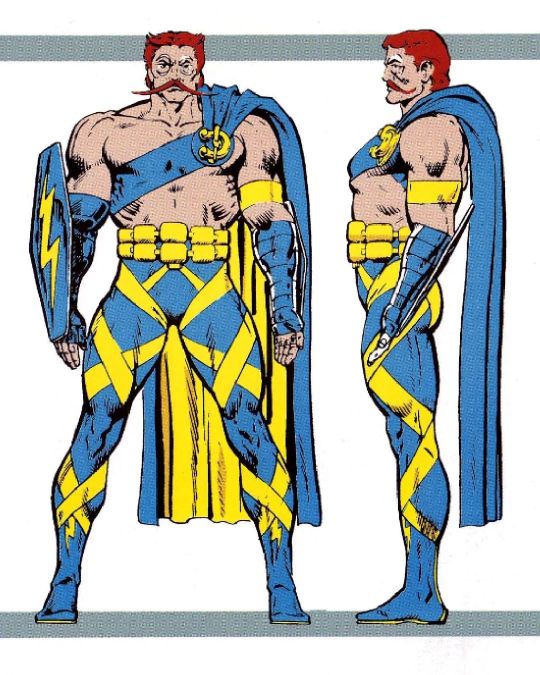
Leir, the Lighting God of Avalon! . Leir was the Lightning God of the Celtic, and a friend of Thor's... . 1st - 4th slide is from the Official Handbook of the Marvel Universe v3 6 (1991) by Keith Pollard and Josef Rubinstein. 5th - 8th slide is from the Mighty Thor vol 1 398 and 399 by Ron Frenz and Don Heck. . #leir #caber #lightning #thor #celtic #donheck #ronfrenz #keithpollard #josefrubinstein #90s #80s #balder #warrior https://www.instagram.com/p/ChNxfsWM06a/?igshid=NGJjMDIxMWI=
#leir#caber#lightning#thor#celtic#donheck#ronfrenz#keithpollard#josefrubinstein#90s#80s#balder#warrior
9 notes
·
View notes
Photo

2 notes
·
View notes
Text
Happy Valentine’s Day! May your day be filled with love and happiness from friends, family, and romantic partners if you have them, but more importantly from yourself!
While it’s still quite early in the relationship with the Remnant’s ROs, that doesn’t mean they don’t want to celebrate it with their love! Some more than others, and some in a more extravagant and wild way while others prefer something more quiet and simple. But they’re all genuine and romantic in their own way! Let’s stick with the adorable side of all for this year, all right? :D

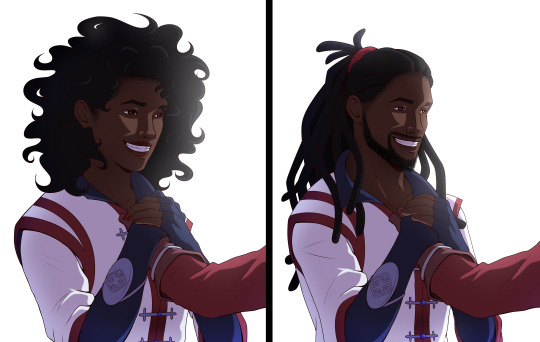
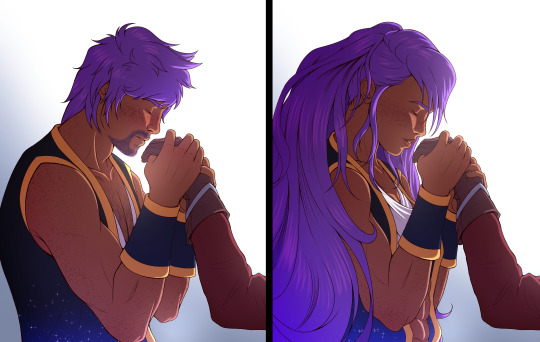
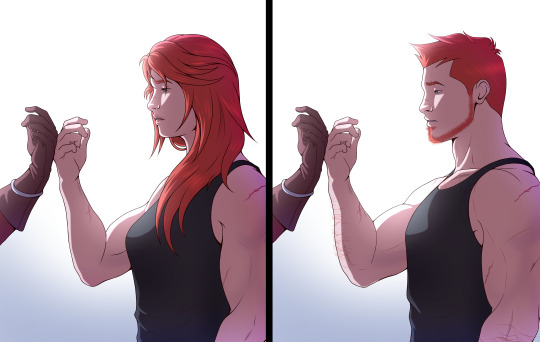
#remnants of the past#interactive fiction#rotp if#if#albert terrastar#ada arastelia#rayco oramas#leire terrastar#gara oramas#omar arastelia#lavina terrastar#luca terrastar#text based game#valentines day#artwork
31 notes
·
View notes
Text
Nature And Travel Photography By Leire Unzueta

#photography#leire unzueta#landscape photographer#women photographers#female photographers#photographers on tumblr#photography blog#photo-art-lady#trees and forests#trees#forest#landscapes#big trees#walking path#nature's beauty#nature photography#landscape photography#landscape#nature
26 notes
·
View notes
Text





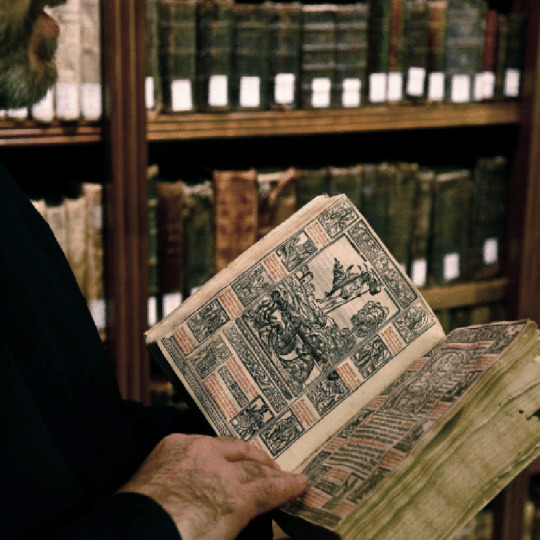
Dark academia Euskal Herria
#euskal herria#basque country#pays basque#pais vasco#euskadi#nafarroa#iparralde#leire#olite#bilbo#bilbao#ilbarritz#dark academia#dark academia aesthetic#places
34 notes
·
View notes
Note
torture for leir?
Has your OC ever been tortured? Would your OC ever torture someone else?
They've never been tortured nor have they tortured anyone, and I don't think they would. If pushed to their limits they might have a moment of extreme desperation and grief like, "I want to see this person suffer for what they've done" but I don't see Leir having the emotional capacity to actually follow through. They're just not built like that. Might kill someone if pushed to it but that's about it. And as for torture to gather information or anything like that, it would definitely go against their morals.
20 notes
·
View notes
Text

My part of the collar with @i-plague-eater
I'm absolutely in love with her AU about young Phobos and Cedric surviving Meridian rebellion and finding a new life on Earth
It's sad in the many same ways it's adorable , and one of them - is this cute friendship between rascal magical kids ✨✨
55 notes
·
View notes
Text
youtube
Cerdita, a short film by Carlota Pereda
#somethingneweveryday#film#short film#spanish cinema#carlota pereda#cinema#elisabet casanovas#laura galán#paco hidalgo#mireia vilapuig#alejandro chaparro#laura galan#rita noriega#david pelegrín#pascual laborda#leire loperena#mónica valiente#monica valiente#maría gómez lou#alberto valcárcel#short#Youtube
24 notes
·
View notes
Text

Xin Yu for Harper’s Bazaar Vietnam, photographed by Leire Cavia
29 notes
·
View notes
Text
King Lear vs King Leir
King Leir (written by an anonymous playwright in the 1590s) is one of the sources Shakespeare used for his King Lear, so I decided to track it down, read it for myself, and compare the two versions. Here are my thoughts:
-Let's get the most obvious difference out of the way first. Since Shakespeare added the Gloucester subplot, and the tragic ending, to the King Leir/Lear story himself, King Leir does not contain any characters who are analogous to Gloucester, Edgar, or Edmund, no one gets blinded, King Leir gets his throne back at the end, and no one dies. Seriously---even Goneril and Regan (or rather, Gonoril and Ragan) are alive at the end (though more on that later).
-Also, all of the shared names between the two plays are spelled slightly differently (though this is probably more down to non-standardized Renaissance spelling than to Shakespeare deliberately changing the names)--we have Leir, Gonoril, Ragan, and Cordella instead of Lear, Goneril, Regan, and Cordelia. This is convenient as a way for me to distinguish between, say, Shakespeare's Cordelia and the anonymous play's Cordella.
-Now for the more interesting differences.
-King Leir opens with so. Much. Exposition. In Shakespeare's King Lear, there's a brief conversation between Kent, Edgar, and Edmund, and then Lear comes onstage and immediately divides his kingdom. In King Leir, there are five straight pages of exposition before the love contest starts. Admittedly, we also get some interesting character dynamics, but it makes for a very different opening.
-In King Leir, all three daughters are unmarried at the start of the play, and their mother (Leir's wife) has apparently just died. Leir plans to marry them off, split his kingdom between them, and retire. Amusingly, he also informs us that "Although ourselves do dearly tender them, yet are we ignorant of their affairs; for fathers best do know to govern sons; but daughters’ steps the mother’s counsel turns", and that, surprise surprise, he really would rather have had a son instead of a bunch of girls. But since he has no sons, this is the next-best plan.
-Leir also has two advisors. One of them, Perillus, is basically a proto-Kent (and seems to be where Shakespeare got the character from, as the versions of the Lear story from Monmouth and Holinshed don't include a Kent equivalent); the other is named Skalligar and basically exists to be evil and drive the plot forward.
-Anyway, in this version, Leir comes up with the love test not because he wants to have his ego stoked, but rather because Cordella has sworn that she won't marry someone she doesn't love, and so has been ignoring her many suitors. Leir is essentially using the love test as a trap: he assumes that Cordella will swear that she loves him more than her sisters, and that once she does, he can say "then, daughter, grant me one request, to show thou lovest me as thy sisters do, accept a husband, whom myself will woo." I...actually can't decide if this is better or worse than Lear's motivation for the love contest. On the one hand, at least he has an actual political motivation for it. On the other hand, he's planning to use the love test to trap his daughter into a marriage she doesn't want (more specifically, he wants her to marry the King of Hibernia, which seems to be a stand-in for Ireland), which is really skeevy on his part.
-Leir also plans to marry Gonoril to the King of Cornwall (which doesn't have an exact equivalent) and Ragan to the King of Cambria (which is explicitly a stand-in for Wales). So yes, King Leir gives the Goneril-character Regan's husband and gives Regan an entirely new husband (in the earlier versions of the story, I'm pretty sure that it's made clear that Goneril marries the Duke/King of Albany and that Regan marries the Duke/King of Cornwall, so it's not just Shakespeare who has the opposite setup).
-Perillus doesn't seem crazy about this plan, but doesn't really say anything to Leir about it (like Kent probably would have). Skalliger, for some reason (I guess we can assume hope for political advancement?) decides to immediately tell the two older sisters about the love competition.
-Unlike in Shakespeare's version, where Goneril and Regan are not fond of Cordelia but seem to be more quietly bitter about her than actively jealous, King Leir's Gonoril and Ragan are openly, angrily, and explicitly jealous of Cordella, because she's more beautiful and accomplished than they are and they're afraid that she'll marry before (and better than) they do. So they're kind of the evil stepsisters from Cinderella. Interestingly, Leir doesn't seem to play favorites between his daughters like Lear does---he doesn't call Cordella his favorite, and Gonoril and Ragan likewise don't claim that he favors her over them.
-Skalliger the Sketchy Advisor then comes in, tells them that their father plans to marry them off to the King of Cornwall and the Prince of Cambria (the men to whom they are already apparently in love with, or at least fond of), and that he wants Cordella to marry the King of Hibernia, and informs them of their father's brilliant "entrap Cordella into marrying my choice of husband for her" plan.
-Gonoril and Ragan immediately decide to cheat on the love test. Since they know ahead of time that their father is going to marry them off to the men they like anyway, they can promise that they love their father so much that they'll willingly marry any man he wants them to, leaving Cordella, whom they know will not say anything of the sort, facing Leir's wrath alone. This is all a noticeable contrast to Shakespeare's play, where none of Lear's daughters seem to have known the love test was coming before he announced it.
-Things play out exactly as the two older sisters plan. They make their extravagant declarations of love, Cordella refuses to do so, and, egged on by Gonoril and Ragan (in another contrast to Shakespeare, where the two older sisters don't speak at all about Cordelia until after their father has already left the room), Leir disowns Cordella for not playing along with his devious plan to entrap her into a marriage she doesn't want.
-Perillus also doesn't speak up for Cordella at all. So far, he's zero for two as Proto-Kent, but he'll get better soon.
-We then cut to the King of Gallia (France), who is planning to pay suit to one of Leir's daughters. He's also bringing along his pal, Mumford, whose main defining character trait is that he wants to scope out all the British women. However, because the King of Gallia is a romantic, he decides that he and Mumford will disguise themselves as pilgrims, so that, presumably, he'll know if whichever girl he decides to court will love him for himself and not his title.
-The King of Cornwall and the Prince of Cambria (whose real name is Morgan, apparently), who are going to be married to Gonoril and Ragan, respectively (remember, the sisters' husbands got switched around in this version), run into one another on the way to Leir's palace. Both are eager to marry their new brides. We will also eventually learn that these two have the combined IQ of a turnip.
-The two of them are married off to Gonoril and Ragan, and then Leir promptly divides his lands between the two of them. Both married couples seem quite happy with the arrangement and will stay that way throughout the play (which parallels Regan and Cornwall's relationship in Shakespeare's Lear but is a noted contrast to the trainwreck of a marriage that Albany and Goneril have.)
-Perillus finally tries to speak up for Cordella here, but it has no effect--though Leir doesn't actually banish him for doing so, possibly because he, unlike Kent, does not say anything like "What wouldst thou do, old man" while arguing Cordella's case.
-Meanwhile, Cordella is trying to figure out what to do with her life now that she's been disowned when she runs into the disguised King of Gallia and Mumford, who are calling themselves "Will" and "Jack". A+ fake names, guys.
-Cordella and the King of Gallia have a chat, wherein Cordella explains what has happened to her and falls in love with the King, whom she thinks is a random pilgrim. She plans to marry him even without him having any title, and then is pleasantly surprised to learn that he's actually the King of Gallia. The two then leave to get married and go to France together.
-So, you know how in Shakespeare's version Goneril gets mad at Lear because his 100 knights are destroying her house and harassing her servants? In this version, Gonoril essentially gets mad at Leir because he keeps scolding her for buying expensive dresses and throwing a lot of parties. So she kind of comes across as a rebellious teenager, and as a lot less reasonable than Shakespeare's Goneril.
-Also, instead of telling her father that he'd better get his knights under control or she'll get rid of some of them, she's already dismissed half of his "portion" (not sure what this means, exactly, as Leir doesn't seem to have an entourage of knights) and is planning to get rid of the other half to "encourage" him to leave. Man, can you imagine how Shakespeare's Lear would've reacted to this Gonoril?
-Skalliger the Sketchy Adviser encourages Gonoril in all this. But don't get used to him, because after this he's going to cease being relevant to the plot.
-Leir is talking to the King of Cornwall (the Albany equivalent), and they seem to be getting along pretty well, when Gonoril suddenly storms in and accuses her father of trying to turn her husband against her. The King of Cornwall tries to calm her down, and Leir's all like "maybe she's moody because she's pregnant". Gonoril reacts to that about as well as you would expect, and then the King of Cornwall just sort of leaves to avoid the argument.
-As soon as the King of Cornwall's gone, Gonoril tells Leir to pack his bags and get out. Which Leir....does. And Perillus goes with him. No horrible curses of infertility or anything! He just goes off to Ragan's house and assumes everything will be fine.
-One similarity between the two plays is that in both cases, the confrontation with the oldest daughter makes Lear/Leir feel guilty about his treatment towards his youngest daughter. The noticeable difference, however, is that while in Shakespeare's play Goneril is being mostly rational and Lear's the one causing friction and shouting insults, in the older play Leir's maybe mildly embarrassing at worst and Gonoril comes across as a spoiled brat.
-Ragan then gets a soliloquy that conveys, in essence "I can do whatever I want, and it's great! I'm so glad my killjoy dad is with my sister and not me!"
-Meanwhile, the King of Cornwall asks Gonoril where her father disappeared to, to which Gonoril replies "Oh, he went off to see my sister with no warning. He's impetuous like that. Don't worry about a thing, honey." The King of Cornwall plans to send a messenger to Ragan's to make sure Leir arrives okay, but otherwise questions none of this. Remember how I said he had the IQ of a turnip?
-Gonoril intercepts the messenger and tells him, to, basically, deliver a letter full of lies to the tune that Leir has been causing problems at her house (she explicitly says she'll lie about her father in her letter). In other words, she wants Ragan to believe that Leir is behaving in the way that Shakespeare's Lear...actually did behave.
-The messenger, as it turns out, is a low-down scumbag (and proud of it), so he's all too eager to deliver a letter full of lies.
-Then Cordella gets a soliloquy about how, although she loves being Queen of France, she misses her father and wants to see him again.
-Leir and Perillus arrive at Ragan and the Prince of Cambria's house (Cambria being the Cornwall equivalent. If Cornwall wasn't an eye-gouging psychopath but did have the IQ of a turnip).
-Cambria is pleased to see Leir, and Ragan pretends to be glad to see him too (though obviously she wants nothing to do with him). This actually is a little reminiscent of the interactions between Lear and Regan in Act II, scene iv, although the fact that the Cornwall-equivalent isn't acting and no one's been put into the stocks are obviously differences between the two scenes.
-Ragan's opinion of her father is naturally only worsened when the Messenger gives her Gonoril's letter full of lies, and, when the Messenger guy casually offers to murder her husband or father for her if she wants him to, she eagerly takes him up on the offer and hires him to ax her father (and Perillus). She tells him that she'll ask her dad and Perillus to meet with her at a specified location tomorrow morning, and that he can kill them there.
-Well, that escalated quickly!
-Cordella and the King of Gallia have another conversation about how much she misses her father and hopes he's okay. The King of Gallia is understandably confused by the level of concern she's showing for her jerk of a dad but agrees to send a messenger to the King of Cornwall's place to check on the old man anyway (since they don't know Gonoril booted Leir out of the house).
-The King of Cornwall and Gonoril are having a conversation, during which the King is wondering what's taking that messenger he sent so long to return with news about the king, when the French messenger shows up and asks how Leir is doing.
-Gonoril and the King both tell the Messenger that Leir isn't at their castle right now, but that they think he'll be back soon (the King really believes this, Gonoril is of course lying), and the conversation then turns to Cordella. Gonoril not-so-subtlety hints that she hopes her sister's not doing too well, and the Messenger immediately picks up on the fact that she's all sorts of sketchy (The King of Cornwall doesn't pick up on this fact, but we've already established that he's got the IQ of a turnip, so that's not surprising.)
-Leir and Perillus are waiting outside for Ragan when the Messenger she hired to murder them shows up. He announces to them that he's going to murder them, and also tells them that Ragan was responsible for the whole thing (after Leir initially assumes that Cordella must have hired the murderer since she's got the best reason to want him dead). Interestingly, the Messenger also claims that Gonoril hired him to kill Leir even though we only saw Ragan doing so. He does have a letter from her with a commission to murder them, though, so maybe she wrote that alongside the letter she sent to Ragan.
-Leir takes the news...shockingly well, all things considered. What's even more shocking is that the two of them manage to talk the Messenger out of killing them. Seriously, he just gives up and leaves, never to be seen again in the play (though presumably richer thanks to still having money from Ragan for the hit he didn't carry out).
-Leir and Perillus then decided to set sail for France and the last remaining daughter. They exchange their fancy clothes with the clothing of some mariners to pay for the passage on the ship.
-The French Messenger, having determined Leir's not at Cornwall, decides to go look for him at Cambria.
-In France, meanwhile, Cordella, the King of Gallia, and Mumford decide to go for a walk on the beach together...in disguise! Apparently the King of Gallia just loves disguising himself as a common person. It's actually kind of an endearing character trait.
-Mumford also gets his second fake name in the play. For their beach walk, he's going to be called Roger.
-The Prince of Cambria, who has noticed that his father-in-law has gone missing, is getting kind of worried about where he might have gone. Ragan replies by telling him that it was probably her evil sister Cordella who was responsible for his disappearance. She puts on a bravura performance of mourning her father's fate, and Cambria, who has the IQ of a turnip, immediately buys it.
-Then the French Messenger comes in and asks them where Leir is. Ragan replies by basically accusing Cordella of murdering Leir. The Messenger is not impressed, but Cambria seems to think his wife's story is true (because, again, he's got the IQ of a turnip).
-The French Messenger makes it clear that he thinks Ragan is responsible for Leir's disappearance, which prompts her to slap him. The Ambassador wisely chooses to get out of dodge, and, as soon as he leaves, Ragan starts fake-crying and claims that Cordella is probably trying to steal their land now that she's totally murdered their father. Her husband, who, bless him, totally believes her, promises that he'll punish Cordella for what she (allegedly) did to their father. He may have the IQ of a turnip, but at least he means well.
-Leir and Perillus, upon their arrival in France, are close to starving for want of food (probably because they couldn't pay for food on the boat). By sheer coincidence, they run into the disguised Cordella, King of Gallia, and Mumford, who are having a picnic on the beach.
-Cordella and the King of Gallia immediately recognize her father and invite him and Perillus to eat with them (which is a good thing, because Perillus was trying to convince Leir to cannibalize him rather than starve! There's the proto-Kent we all know and love!)
-After they eat, Cordella reveals her true identity to him and they reconcile. Leir having also told her and her husband about Gonoril and Ragan's plot to murder him, she and the King of Gallia immediately promise to invade England and restore him to the throne.
-The invasion is a complete success, in part because the two soliders on watch decide to abandon their post and get drunk rather than actually doing their jobs. It also helps that most of England is still in support of Leir.
-That being said, Cambria and the King of Cornwall do manage to raise armies against the King of Gallia's army, and they and their wives confront King Leir, Cordella, and the King of Gallia.
-Gallia accuses the two daughters of plotting to murder their father. They of course deny this and claim that he's just using that as an excuse to justify the invasion. Cambria and the King of Cornwall still back their wives up, which is nice and all, but you'd think they'd be getting at least a little suspicious by now (especially Cambria!). IQs of turnips, the both of them.
-Leir even has the letters that they wrote to have him murdered! Sure, Ragan tears them up (in a scene reminiscent of Goneril trying to tear up her letter to Edmund in the end of Shakespeare's King Lear), but still neither of them get suspicious. Nor do they seem to be suspicious of the fact that Leir is with Cordella in spite of the fact that presumably at least Cambria should believe that she tried to murder him! Seriously, how are they possibly that stupid?
-Anyway, the two sides fight, and the King of Cornwall and the King of Cambria both run away (presumably with Gonoril and Ragan) when they lose. Leir is restored to the throne, and he gets to be happy with Cordella and the King of Gallia.
-Except that his daughters, who tried to murder him, are still alive. And so are their idiot husbands, who are still presumably in total support of them and would be on board to fight against Cordella and Gallia again as soon as they manage to regroup and gather up new men for their armies. And no one seems intent on doing anything about that!
-And then the play just ends, as if we're operating under the assumption that Gonoril and Ragan are just going to go "Oh, well. Our plan to kill our dad and take his crown failed. Guess we're just going to do something else with our lives now." or something.
-Seriously, Gonoril and Ragan's husbands are unbelievably stupid. Albany and Cornwall aren't geniuses, but they're a million times smarter than the King of Cornwall and the Prince of Cambria from King Leir!
TL; DR: Shakespeare's play is obviously more complex and better-written, but there's something very entertaining about reading this earlier play that tells the same story in such a wildly different fashion.
I honestly think the three daughter's husbands may be the best part of King Leir. They all clearly love their wives, the King of Gallia's passion for disguising himself is great, and I can't help but kind of smile at how stupid the King of Cornwall and the Prince of Cambria are. They may have the combined IQ of a turnip, but they mean well.
#william shakespeare#shakespeare#king lear#king leir#goneril#regan#cordelia#the earl of kent#sort of
20 notes
·
View notes
Text
man thought about a toh theory for a little too long. Anyway, Phillip 100% burnt down this building, but it gets worse! We can’t trust Masha’s story

Local man thought too hard about one aspect of toh and is now convinced about something entirely different, luckily also within toh.
But yeah, Phillip burned down this fucking building. He’s also a lying little cunt, and he’s tricked more people than just Luz with a journal. All under the cut, because this one got LONG.
please do not leave your suspension of disbelief at the door, youre gonna need it.
So, This Fucking Statue:

Up until recently, it was logically assumed within fandom that, oh! The Wittebanes must have founded Gravesfield, cool! The statue is one of the only landmarks we see after all, so wouldn’t it make sense to assume they founded it? But in Thanks to Them (even if it does fuck the timeline to all hell and back with the 1613 debacle) the episode makes it clear that the Wittebanes did Not found Gravesfield, and no one in the town actually believes this.
So the thought occurred to me, why the fuck does this statue even exist?
I’d argue tourism, for the main part. Tourism and a bit of history. Masha refers to the disappearance of the Wittebanes as “the eeriest unsolved mystery of Gravesfield.” Famous mystery! Local history! All decent reasons for a statue.
In addition, Masha also says also says, “[the Wittebanes] became witch hunters. Local lore suggests that the brothers Wittebane met a real witch...” and yeah, this all fits the idea of a famous local mystery! The way Masha refers to the story as well, “the tale of the brothers Wittebane.” Sounds pretty colloquial, right?
And of course, why wouldn’t the town memorialise what is probably its only tourist attraction and the brave, brave witch hunters of the past?
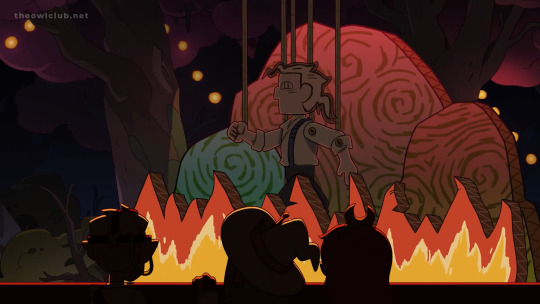
“[Caleb and Evelyn] used a secret code to travel between worlds.”
Then the story starts to fall apart a bit, because for one, that does not look like a secret code. For two, when the fuck have we seen a secret code before with the portals? Ever?
And sure, you could definitely argue that oh, he’s sinking down to hell. Fire = hell = witchcraft = boiling isles, easy!
But then there’s another piece of fire imagery just after this just as Masha talks about Phillip trying to seek out his brother:
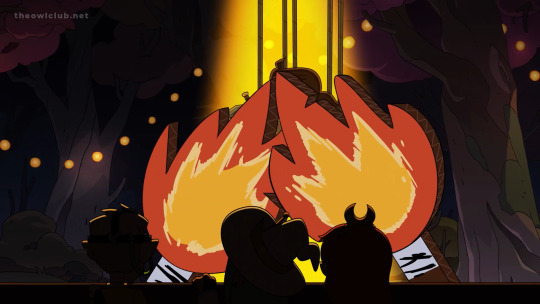
But that still technically fits the theme. Fire = hell = witchcraft = boiling isles. Makes sense! They both ended up in the boiling isles, case closed.
But then, why is Phillip being burned by the same torches that the witch hunters were holding just a few seconds earlier?
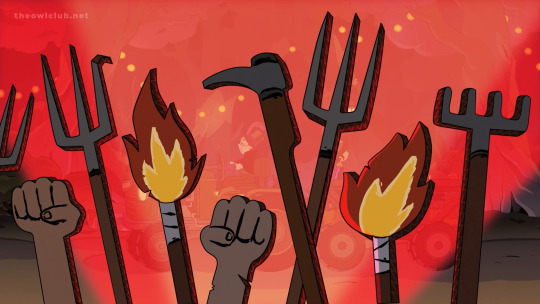
Maybe its just some teenagers who made a hay ride reusing assets?
We’ll diverge for a second to our only other source of Gravesfield history within the human realm:

This bitch.
As Jacob tells it from “the secret history of Gravesfield” (assuming this is the title of the book in his hands):
“in the 1600s, [Gravesfield] was a peaceful colony until tragedy struck. Two brothers were lured into a realm of evil by a real witch, never to be seen again.”
Contrast this with Masha’s seemingly colloquial, local history:
“They tried to fit in with this town and its unsavoury practices... local lore suggests that the brothers Wittebane met a real witch from another world... and the older brother was spirited away. She dazzled him with magic and visions... they used a secret code to travel between worlds. Phillip set off to save his brother and bring the witch to justice, but neither were ever seen again.”
In one of these stories, both of the Wittebanes are victims of one magnanimous evil. This is only found in the secret history. In the other, Phillip is a man on a noble mission, a story with no known conclusion. Since Masha’s story is seemingly not the “secret one”, it would make sense that this is the Gravesfield accepted one! It even makes sense when you look at the statue, Phillip is behind Caleb, seemingly in pursuit.
Oh, but wait a minute-

In the forgotten history, one of the brothers is holding a torch. Said brother is holding a glyph (Phillip activity) while the other one has a bird on his shoulder (Caleb activity). And what do we see on the page beforehand?

This building, on fire.

Since in the forgotten history they both succumb to the “real witch,” maybe Phillip is just another victim in this narrative? He set the town hall or whatever on fire because oh! A witch!
But that still doesn’t explain why Phillip is being burned by the witch hunters???
But then, what the fuck? There is clearly some truth in Masha’s story- Evelyn’s name, Caleb and Phillip’s names, but they doesn’t say shit about Phillip burning down a fucking building, maybe we should just discredit Gravesfield’s forgotten history as inaccurate? But it clearly displays flapjack, and a glyph! Masha and their visuals don’t have that.
But here is where I’m going to ask you to not take the Wittebros reveal from Thanks to Them at face value. Not even in the slightest. I’d ask you to instead think: “if I were an animator trying to imply that what is being said is false, what options are available to me?” TOH at this point doesn’t have enough run time to waste visual imagery nor to wrap up every single plot point they introduced in season 1+2A (truncation was announced in October 2021, 2A and Yesterday’s Lie finished airing in August). Hell, we don’t even have a fucking intro anymore. Everything the animators are doing- they are doing for a reason. Why the hell would Phillip be burned by torches instead of just average old fire like Caleb? Like Flapjack-
But wait a fucking second, why in God’s fucking name is Flapjack here???

AND WHY IS HE ON FIRE?
“...she dazzled him with magic...” yeah yeah sure why the fuck not, fire = magic whoop-de-doo, but think with me here. The Clawthornes are palisman carvers, sure, I get that, but why in her right fucking mind would Evelyn just offer Caleb a palisman right off the bat? This is their first meeting in this story, right?
In addition, even though this is in the period before palistrom wood is endangered, throughout the show older characters with palisman typically have theirs custom made in some way!!! Palismen bond on emotion, and in a period with abundant palistrom wood, why Wouldn’t you hand carve a palisman guaranteed to fit you? Or, hell, why would you not get it custom made For You by a skilled carver? Palismen are a very personal thing, so why!!! Why does Evelyn just have Flapjack on hand?
(in addition why do none of the characters LOSE THEIR SHIT OVER THIS, but I digress)
And shit! Just keeps not adding up! Caleb and Evelyn used a “secret code” to travel between worlds. This, outright, sounds like complete bullshit, and we know that its bullshit because we see Evelyn and Caleb’s portal, and its activated by Titan’s Blood, as is literally every other portal. So where the hell did this trivia even come from? It almost sounds like a taunt, “oh yeah the method to do this did exist, but its a big old secret so no one will ever be able to do it again lmao!” It just sounds like a lie.
But at the same time, this blatant lie connotates that travel was possible more than once, because why have a code for a portal you can never return from? This explains why the hell Flapjack is here, I guess. They have met more than once, so she offers him Flapjack, lovely! But this actively goes against Masha’s words which imply Caleb was lured in, the singular and only victim. But seriously, where the fuck is this narrative coming from-?
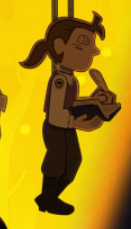
Met with a Real Witch, their Greatest Enemy, Caleb is holding a pitchfork. Phillip is writing in a book, just like in season 2! Phillip’s journal throughout season 2 opens with an introduction. He’s just started a new journal!
It is also FULL OF FUCKING LIES.
Here’s what I’m proposing: there are three stories going on here.
One: Masha’s spoken story. AKA, Phillip’s that he is WRITING DOWN IN FRONT OF US.
Two: The Real Story. AKA, the one we see as visuals as Masha tells Phillip’s and without the same timing presented in Masha’s
Three: Gravesfields “Forgotten” History. AKA, a blend of the truth and Phillip’s, written years after the actual events.
I cannot explain how Phillip managed to get this journal/fake ass story out to Gravesfield, nor can I explain if I’m even right in interpreting these visuals. I have no fucking clue why the people of Gravesfield would turn on Phillip and Phillip alone!!!
I am, however, 90% certain that the story we have heard from Masha is not the truth, and this will be in some way revealed in our upcoming two episodes. If I’m wrong, then fuck me I guess. If I’m right? I’m never shutting the fuck up again.
There’s some other potentially related evidence thats stuck with me so I’ll just pop it all at the bottom here real quick, but unless this particular worm has already starting digging its way through your brain, then hope you enjoyed!

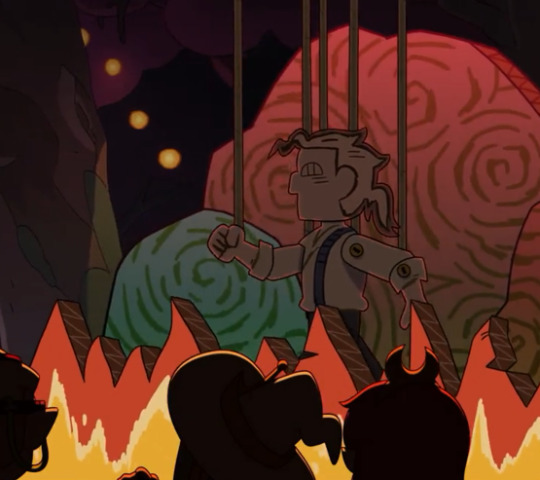
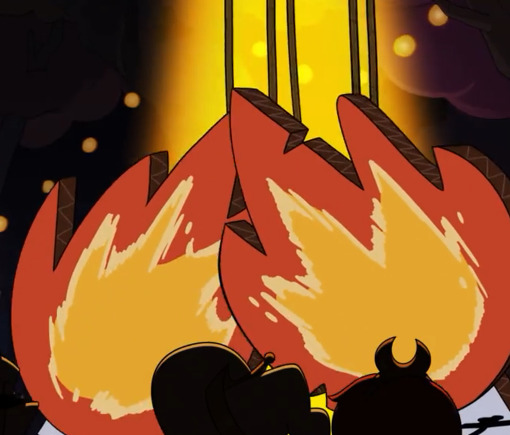
caleb leaves the spotlight and never reenters it. the yellow light doesn’t leave phillip even as he burns. ???
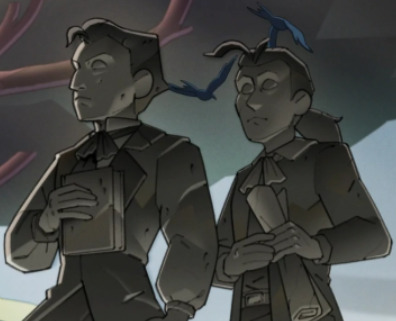
caleb hold book. why ???

circles light glyphs ???? i also have no idea why the fucking bird is on fire
-In forgotten history they are both victim,,, phillip’s history he is saviour to caleb’s victim,,, real history phillip has knife ??? i can think of potential postives to phillip in both scenarios whether he is a victim or not (oh i Suffered,,,, vs I Saved And Am Strong !!!)
#The Owl House#toh#toh theory#phillip wittebane#caleb wittebane#the owl house theory#thanks to them#thanks to them spoilers#leir time#thank you to the discord server for listening to my intense ramblings on this one#now watch as this gets disproved to hell and back in three weeks time lmao
48 notes
·
View notes
Text
Participating in the Izzy Hands Festive Fix-It Fest, I contributed Whittling and Sunny Afternoon, two gen stories about Izzy's relationships with the crew of the Revenge.
6 notes
·
View notes
Text
watching the lives last night of the riots in dublin last night was sickening. using the crime committed against those children to further your sick fascist ireland is full propaganda. those people setting fire to the buses do not care about women and children, they just wanted an excuse to hurl abuse at refugees, foreign nationals and irish people of colour. stupid sick fucks who dared to use that awful incident to push their racist bigotry.
#nairé orm agus ar an tíre go leir faoi cad a tharla oíche an fiche triú. amadàn agus cunts go leir a bhfuil a iarradh caitheadh maslaí#ciníocha ar daoine na hEireann#eire#ireland
13 notes
·
View notes
Text
Hey! I've added (finally) all the information for the ROs! Along with a simple drawing of them ;)
#remnants of the past#interactive fiction#if#rotp if#twine#itch.io#leire terrastar#luca terrastar#albert terrastar#lavina terrastar#ada arastelia#omar arastelia#gara oramas#rayco oramas
38 notes
·
View notes